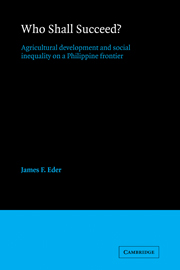Book contents
- Frontmatter
- Contents
- List of tables, figures, and maps
- Preface
- 1 Introduction
- 2 Rich man, poor man: life in a frontier farming community
- 3 The economic and social origins of the migrant farmers
- 4 Eight migrants
- 5 The origins of social inequality
- 6 The maintenance of social inequality: earning a living
- 7 The maintenance of social inequality: earning prestige
- 8 The perpetuation of social inequality?
- 9 Conclusion
- Appendixes
- Notes
- Bibliography
- Index
8 - The perpetuation of social inequality?
Published online by Cambridge University Press: 23 May 2010
- Frontmatter
- Contents
- List of tables, figures, and maps
- Preface
- 1 Introduction
- 2 Rich man, poor man: life in a frontier farming community
- 3 The economic and social origins of the migrant farmers
- 4 Eight migrants
- 5 The origins of social inequality
- 6 The maintenance of social inequality: earning a living
- 7 The maintenance of social inequality: earning prestige
- 8 The perpetuation of social inequality?
- 9 Conclusion
- Appendixes
- Notes
- Bibliography
- Index
Summary
That “the rich get richer and the poor stay the same” is an oft-repeated statement in San Jose, and one seemingly borne out by the analysis in the last two chapters. There we saw that social inequality is today associated with an incentive structure that tends to maintain the existing distribution of wealth and poverty on a day-to-day and year-to-year basis. What, however, of the children of the rich and poor in San Jose; are they destined to inherit the life chances and life-styles of their parents? Shall they be rich and poor as well? These are questions of a different order, for the ability of families to maintain their economic and social advantages over the short term is not in itself evidence that they can necessarily pass these advantages on to their offspring. To assess whether a child's position at birth in San Jose today can in fact reliably predict his position as an adult, we must change our explanatory focus and examine the possible mechanisms whereby advantage and disadvantage might be transmitted from parents to children.
This chapter, then, concerns the future. It asks whether the social inequality now established in San Jose is likely to be perpetuated across generations. To answer this question I focus on a series of events and processes occurring in the life cycle of an individual between the time he is born and the time he marries: birth itself, child-training, education, adolescence, separation from the parental household, and finally, inheritance and marriage.
- Type
- Chapter
- Information
- Who Shall Succeed?Agricultural Development and Social Inequality on a Philippine Frontier, pp. 153 - 177Publisher: Cambridge University PressPrint publication year: 1982



